In the last few years PBI Mexico has received more and more requests for international accompaniment from civil society. In large part this is due to the context of extreme violence that the country suffers and the increase in aggressions, threats and harassment against human rights defenders. Due to this new situation, PBI Mexico initiated an exploratory mission in 2012 to various states of the Republic, among those Chihuahua, Coahuila, Baja California, Puebla, Tlaxcala and the Estado de Mexico. Following this exploratory mission, PBI Mexico decided to open a new team in the north of the country, made up of international volunteers, to accompany human rights defenders in the states of Chihuahua and Coahuila.
Chihuahua and Coahuila were identified in our exploratory mission as states with high levels of risk for human rights defenders. This conclusion is backed by a recent report (2013) by the United Nations Office of the High Commissioner for Human Rights, that declares Guerrero, Oaxaca, Chihuahua, Coahuila and the Federal District as the most dangerous states in the country in which to be a human rights defender.
We emphasize that the themes with which human rights defenders work in these states are emblematic of the situation throughout the country: violations of the rights of migrant persons, disappearances, feminicides, public security and human rights, amongst others.
As a response to the requests from civil society and to support the organizations that request international presence, PBI installed a team in Chihuahua city in August 2013.
More information:
- Briefing on the defense of human rights in the states of Chihuahua and Coahuila and PBI's work in the region
- A panorama of the defense of human rights in Mexico: initiatives and risks of Mexican civil society. Published by PBI Mexico, April 2013.
- Press Release on the opening event of the new Northern Team
- PBI Mexico's history
- PBI's exploratory mission to Chihuahua
- PBI's exploratory mission to Coahuila
Organizations accompanied by PBI in Chihuahua and Coahuila
Paso Del Norte Human Rights Center
Fray Juan de Larios Diocesan Center for Human Rights
Juan Gerardi Human Rights Center
Pasta de Conchos Family Organisation
Paso Del Norte Human Rights Center
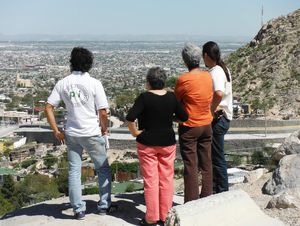
- Paso Del Norte members show the Vale of Juárez to a PBI volunteer
The Paso del Norte Human Rights Center is located in Ciudad Juárez, in the state of Chihuahua, and is run by the priest Óscar Enríquez Pérez. It was founded in 2001 to attend to the defense of human rights in the region and the situation of increasing violence in the city, especially by providing guidance and counseling to the community regarding their civil rights. The context of constant crimes against women, executions, corruption of the public security forces and a general climate of impunity was hence recognized. The organization has two principle lines of work: one, of accompanying victims, prioritizing cases of torture and forced disappearance, and the other of political advocacy. The cases are handled comprehensively with legal work, communication and psychological care provided. In addition, the organization also provides specific advice and training workshops, for example, regarding the use of the Istanbul Protocol.
Paso del Norte has been the target of threats and harassment by the federal and state authorities, including a raid on their offices by federal police on 5 June 2011 – an incident that resulted in a recommendation from the National Commission for Human Rights (CNDH) – as well as several episodes of surveillance in 2012. The members of the organization are aware that because they work sensitive cases of complaints against members of Mexican security forces, their level of risk is high and they constantly fear reprisals.
This is the first organization accompanied by PBI in the north of the country. The accompaniment began in August 2013.
- Information sheet: Paso Del Norte (pdf)
- “Defendamos la Esperanza” Campaign
- A panorama of the defense of human rights in Mexico: initiatives and risks of Mexican civil society. Published by PBI Mexico, April 2013, pp. 21-22.
- Video about the history and work of Paso del Norte (in Spanish)
Saltillo Migrant House
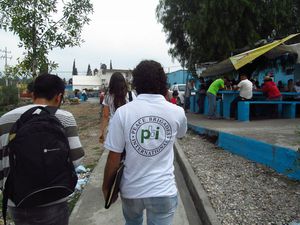
- PBI volunteer accompanies a member of the Saltillo Migrant House
The Saltillo Migrant House (of the Borders With Justice Association), located in the capital of the state of Coahuila, provides humanitarian assistance to hundreds of transmigrants daily. The shelter opened its doors for the first time in 2002. The shelter has a maximum capacity to accommodate 60 people, however, there are times when the shelter has housed up to 316 migrants; it provides support to more than 8000 migrants each year. The humanitarian attention that the shelter offers includes medicine, clothes, food, space to rest, preparation to continue the trip and psychological support. The migrants who come to the shelter seeking assistance have usually spent from three days to three months traveling through Mexico.
The shelter has developed several institutional strengths, which make it stand out from other shelters in Mexico. More than just humanitarian assistance, the shelter carries out solid work in the defense of migrants' human rights, through the documentation of cases of kidnapping, extortion, abuses and aggressions experienced by migrants on their way through Mexico. Furthermore, the shelter's departments of documentation, judicial issues and strategic litigation take care of the lodging of reports concerning the aggressions that the migrants experience.
Nevertheless, the members of the shelter have been victims themselves of harassment, surveillance and threats due to their work in the field of human rights. Because of its risk situation, the shelter received precautionary measures from the CNDH in 2009 and by the IACHR in 2010. Nonetheless, they have suffered various security incidents over the past few years. PBI's accompaniment to the Saltillo Migrant House was made official in early February 2014.
- Information sheet: Saltillo Migrant House (pdf)
- A panorama of the defense of human rights in Mexico: initiatives and risks of Mexican civil society. Published by PBI Mexico, April 2013, pp. 29-31.
Fray Juan de Larios Diocesan Center for Human Rights
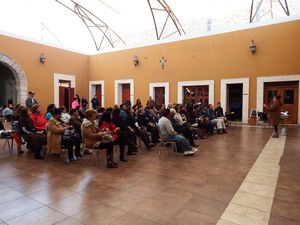
- Meeting between Fray Juan de Larios and Fuundec in Saltillo
The ”Fray Juan de Larios” Diocesan Center for Human Rights, located in the city of Saltillo, Coahuila, was founded in 2002 by the Bishop Raul Vera. Since 2009, the Center has supported the families of disappeared persons, who later started identifying themselves as Fuundec. The process of counseling and comprehensive social defense that they have driven has allowed the families to empower themselves and to sit and talk to state and federal authorities in order to present their demands. In addition, they have worked, together with the Saltillo Migrant Shelter, for the realization of the rights of migrants that cross the state in their attempt to reach the United States. The Center also has an education and training area aimed at different sectors of the population.
PBI's accompaniment to the Fray Juan de Larios Diocesan Center for Human Rights was made official in early February 2014.
- Information sheet: Fray Juan de Larios Diocesan Center for Human Rights (pdf)
- Dignas: voices of women human rights defenders in Mexico. Published by PBI Mexico, March 2012, pp. 20-21.
- A panorama of the defense of human rights in Mexico: initiatives and risks of Mexican civil society. Published by PBI Mexico, April 2013, pp. 44-47.
Juan Gerardi Human Rights Center
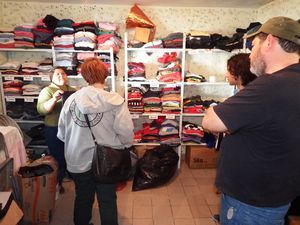
- PBI volunteer and human rights defenders at the migrant shelter managed by the Juan Gerardi HRC
The "Juan Gerardi" Human Rights Center began its work in 1999. It is located in Torreón, Coahuila, in the region known as La Laguna. The Center aims to promote the initiatives of individuals and organizations so they can be subject to the transformation of their own reality. These initiatives must be based in respect and peace with justice. Currently, the organization works in six areas: migrants, environmental defense (especially water), disappearances (collaborating with Fuundec), youth, communication and education/training.
The center accompanies different organizations that are working in La Laguna, among them Fuundec; organized families in search of their disappeared relatives. In addition, they support the Day Center “A Step Towards Hope”, a day shelter for migrants in Torreón (founded in May 2011) and are active in environmental defense together with collectives such as Laguneros for Peace and Citizenship Lagunera for Human Rights (Ciladhac).
Due to the nature of the work that they carry out, the organization has experienced several incidents, including a raid of their headquarters by security forces in 2012 and the theft of documentation from their offices in 2013.
PBI's accompaniment to the Juan Gerardi Human Rights Center was made official in early February 2014.
- Information sheet: Juan Gerardi Human Rights Center (pdf)
Pasta de Conchos Family Organisation
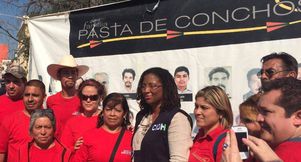
- Members of the PCFO with Commissioner Tracy Robinson from the IACHR
The Pasta de Conchos Family Organisation has worked for over a decade in the Coal Mining Zone of the state of Coahuila, insisting that the bodies of 63 miners still trapped in the Pasta de Conchos mine be retrieved, while also demanding better safety conditions for miners who continue to work in the area. PBI has accompanied the organisation and its director Cristina Auerbach since 2014 due to the high level of risk they face stemming from their legitimate work in defence of human rights.
PBI has accompanied the PCFO and Cristina Auerbach since 2014 through regular visits to the Coal Zone and by sharing international concern for the safety of the organisation's members with state and federal authorities. Due to the heightened risk faced by Cristina Auerbach and the wave of smear campaigns directed at her in March of 2016, PBI released a public statement making the three levels of government aware of our deep concern for the situation. After PBI's activation, Front Line Defenders came out in support of Auerbach and published an Urgent Action. Likewise, PBI convened a meeting with representatives from 12 embassies to inform them on the situation.
- Information sheet: Pasta de Conchos (pdf)
-
PBI's public statement
For information on other Human Rights Defenders supported by PBI in the states of Chihuahua and Coahuila click here
For current news on human rights defenders in the states of Chihuahua and Coahuila click here
